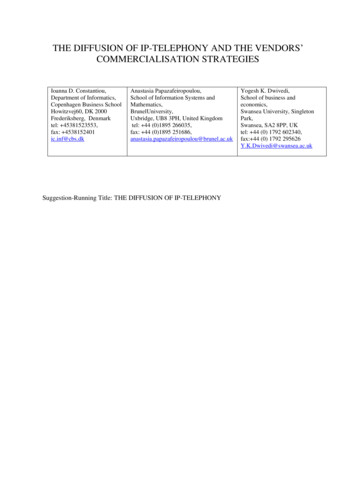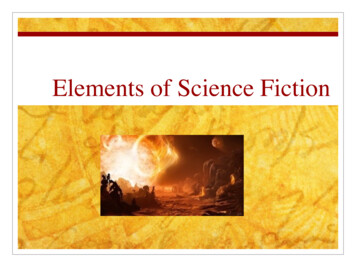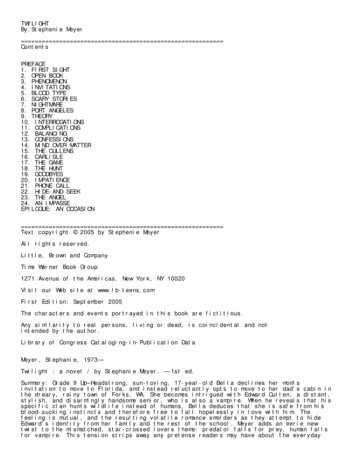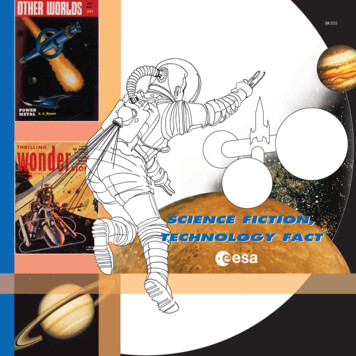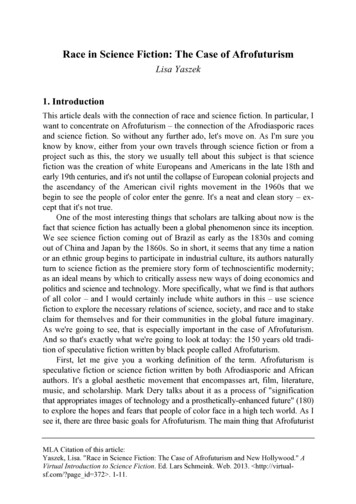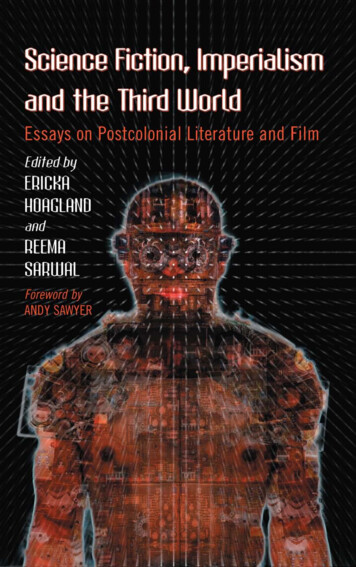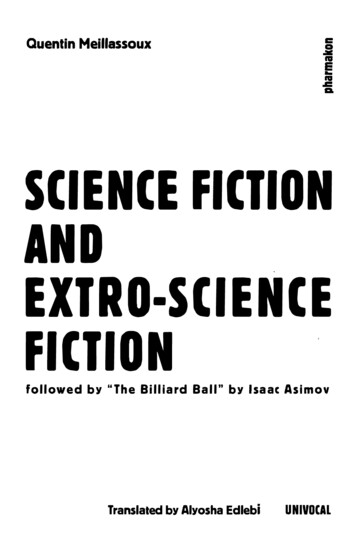
Transcription
Quentin MeillassouxSCIENCE FICTIONANDEITRO·SCIENCEFICTIONfollowe d by "T h e Billiard Ball" by Is a ac A s imovTranslated by Alyosha EdlebiUNIVOCAL
Metaphysique et fiction des mondes hors-scienceby Quentin Meillassoux 2013 Editions Aux forges de VulcainTranslated by Alyosha Edlebias Science Fiction and Extra-Science FictionFirst EditionMinneapolis 2015, Univocal PublishingPublished by Univocal123 North 3rd Street, #202Minneapolis, MN 55401Thanks to Robyn Asimov, Suhail Malik,Robin Mackay, and Grace KavanahDesigned & Printed by Jason WagnerDistributed by the University of Minnesota PressISBN 9781937561482Library of Congress Control Number 2015936112
Science Fiction and Extro-Science Fiction 1I;woul like to elaborate, throughout the courseof this text, a difference between two regimes of fic tion that strikes me as metaphysically significant.These two regimes concern experimental sciences;to designate them, I will use two names , one ofwhich is well-known and the other is a neologism:science fiction, on the one hand; and on the other,what I call "extra-science fiction,"2 or in shorthand:SF and XSFBefore explaining this difference, I would like tointroduce a clarification in order to avoid misunder standings and potential objections. I will propose adefinition of science fiction that is rather commonand banal, in order to clearly distinguish it from1. A shorter version of this text was initially presented on May 18, 2006,at the "Metaphysics and Science Fiction" conference at the Ecole normalesuperieure (Paris-Ulm).2. Fictions (des mondes) hors-science.3
what I call extra-science fiction. But once I havedefined these two notions, you will perhaps thinkthat the literary genre called science fiction also con tains extra-science fictions, that there are examplesof XSF novels in SF and therefore that the literarygenre SF contradicts the distinction I am maintain ing. My aim is not to contest this point; rather, it isto underscore a conceptual distinction and to showits philosophical import. Starting from here, twothings are possible: either no XSF novels exist in fu turistic literature , and the genre itself of "science fic tion" confirms the proposed conceptual difference;or such novels do exist. In the second case then, mythesis is that these XSF novels-even though theyare inscribed in the SF genre-do not belong to sci ence fiction, but to a profoundly different regime offiction and should as such be singularized: they con stitute, in some sense , a "genre within the genre ," an"empire within the empire."1. Science Fiction and Extro-Science FictionLet's examine this difference: science fiction andextro-science fiction.Generally speaking, in science fiction the relationof fiction to science seems to be the following: it isa matter of imagining a fictional future of sciencethat modifies, and often expands, its possibilities of4
knowledge and mastery of the real. Man's relation tothe world undergoes a change by virtue of a modi fication to scientific knowledge, which opens upunheard-of possibilities for him. Whatever upheav als the possible futures introduce, they necessarilystand-at the heart of science fiction-within the or bit of science. Every science fiction implicitly main tains the following axiom: in the anticipated futureit will still be possible to subject the world to a sci entific knowledge. Science will be transfigured by itsnew power, but it will always exist. Hence, of course,the generic name to designate this type of literature:fiction can produce extreme variations, but at theheart of it a science is always present, albeit in anunrecognizable form.Now, what do we mean by "fiction of worldsoutside-science," namely extra-science fiction or"XSF?" By the term "extra-science world," we are notreferring to worlds that are simply devoid of science,i.e. , worlds in which experimental sciences do notin fact exist. For example: worlds in which humanbeings have not, or have not yet, developed a scien tific relation to the real. By extra-science worlds wemean worlds where, in principle, experimental scienceis impossible and not unknown in fact. Extra-sciencefiction thus defines a particular regime of the imagi nary in which structured-or rather destructured worlds are conceived in such a way that experimental5
science cannot deploy its theories or constituteits objects within them. The guiding question ofextro-science fictign is: what should a world be, whatshould a world resemble, so that it is in principleinaccessible to a scientific knowledge, so that it can not be established as the object of a natural science?My aim, throughout the course of this text, isto provide a precise conceptual content to this stillvery general and simply negative definition of extro science worlds. At the same time, I will try to showthe properly speculative benefit of becoming awareof the difference between science fiction and extro science fiction and, on the other hand, of cultivatingXSF, this type of imaginary that is distinct from SF.Why do I raise such questions? If I am interested inextro-science fiction, it is because this fiction is thesource of a very classical metaphysical problem towhich I have devoted myself for a long time, namelythe problem of induction. Or more precisely: theproblem of the necessity of the laws of nature in theway Hume posits it in Treatise of Human Nature, andlater on in Enquiry on Human Understanding. Thisproblem, whose nature I will recall in a moment,was profoundly misunderstood by one of the mostimportant epistemologists of the 20th century: KarlPopper. In fact, Popper boasted of having been thefirst to designate the problem of induction with the6
expression "Humes Problem," and he claimed tobring a rigorous and original response to this prob lem. I want to begin by showing that Popper's failureto understand Hume stems precisely from the factthat he conflated a problem of XSF with a problem ofSF. Popper did not raise the same problem as Hume;in my opinion he mobilized another type of imagi nary, because if Hume mobilizes the imaginary ofextro-science fiction to pose his problem, theproblem Popper raised can only be conceived bymeans of a science fiction imaginary.Next, I will examine Kant's response to Hume'sproblem found in the Critique of Pure Reason, andmore precisely in the "Objective Deduction of theCategories. " In contrast to Popper, Kant was notmistaken about the nature of Humes problem; heresponded to it on its proper terrain, the one thatconsists in "fictioning" a world in which sciencehas become impossible. But I will equally critiqueKant's thesis, by demonstrating that the weaknessof the transcendental deduction stems in particularfrom an insufficiently developed imaginary of extro science-an imaginary that is too restricted in somesense. I will then show that a more acute sense ofextro-science fiction allows us to extract a thirdresponse to Hume's problem, distinct from bothPopper's and Kant's .7
2. Two Billiard Games: Hume and Asimova) Forwulation of the ProblemThe most celebrated of Hume's writings where heposes the problem of causal necessity consists of adescription of an imaginary billiard game, in thecourse of which the laws of collision cease to hold.Here is the relevant passage from Enquiry on HumanUnderstanding:When I see, for instance, a billiard-ball moving in astraight line towards another; even suppose motionin the second ball should not by accident be sug gested to me, as the result of their contact or impulse;may I not conceive, that a hundred different eventsmight as well follow from that cause? May not boththese balls remain at absolute rest? May not the firstball return in a straight line, or leap off from the sec ond in any line or direction? All these suppositionsare consistent and conceivable. Why then should wegive the preference to one, which is no more consis tent or conceivable than the rest? All our reasoningsa priori will never be able to show us any foundationfor this preference. 33. David Hume, An Enquiry Concerning Human Understanding; and OtherWritings, ed. Stephen Buckle (Cambridge University Press, 2007), 32.8
In these imaginary scenes, the question Hume posesconsists in knowing what exactly guarantees for us but also what convinces us-that physical laws willstill be valid in the next moment, since neither expe rience nor logic can give us such an assurance. Forthere is no logical contradiction in imagining thatthe laws will be modified in the future, and no expe rience of past constancy allows us to infer that theywill endure in the future. On the one hand, it is infact not contradictory for nature to obey up to timet a certain number of physical constancies and tostop obeying them at time t 1. An entity is contra dictory only if it is at the same time, and accordingto the same aspect, a and non-a. But if an entity isin state a (nature subject to known laws) and thenin state non-a (nature not subject to known laws),logic cannot find any fault with it. So we cannot,in the name of logical coherence, refute a priori thehypothesis according to which nature could beginto obey constancies other than those already identi fied. If we cannot refute a hypothesis a priori (thatis, independently of experience, by pure reasoning),we can still attempt to refute it a posteriori, i.e., by anappeal to experience. However, experience by defi nition can only tell us about the present (what I amexperiencing now) and about the past (what I havealready experienced); there is no experience of thefuture. How can we then ground within experience9
the certainty that tomorrow nature will obey theknown constancies it obeys today? It will no doubtbe objected that . cience allows us to predict withprecision a certain number of future phenomena like the eclipse anticipated by the astronomer-andthat these predictions have been confirmed nu merous times in numerous domains, and this factgrounds, in reason, our confidence about predic tions that have yet to be confirmed. But such predic tions always rest on the hypothesis that current lawswill be the same as the laws to come, precisely thepoint that has to be demonstrated. Even if naturallaws have remained constant up until now (and onlythe theories that deal with these laws have evolved,not their intrinsic reality), nothing in experience which is, once again, always present or past-canassure us this will always be the case. Nothing allowsme to be certain that nature will not, soon, at thisvery moment, start doing just about anything, as inthe Humean billiard game, defying every theory andevery possible experience. Nothing except "goodsense," one will perhaps say. But what should wemake of a "good sense" that relies neither on logicnor on experience?Thus the question that arises is knowing wheth er our certainty about a stable nature is justifiedand-failing that-understanding where this sub jective assurance comes from that allows us to be10
so perfectly confident, on a daily basis, of the futureconstancy of the real. As we know, Hume believedthat only the habit of past empirical constancies canpersuade us that the future will resemble the past,without there being anything rational at the foun dation of this judgment. In other words, instead ofproving that there is indeed a causal necessity, theskeptical philosopher confines himself to uncoveringthe psychological source of our certainty that such anecessity exists. This solution did not satisfy thosewho, after Hume, attempted to resolve in their turnthis challenge to reason-mainly Kant, then KarlPopper.Let'.s begin with the most recent solution,Popper's , as put forward in his famous workThe Logic of Scientific Discovery, and pursued furtherin his later works.In principle, this solution is very simple. If wewere to ask Popper what it is that guarantees thatthe Humean billiard ball will not adopt the afore mentioned fantastical behaviors, not only wouldhe have to respond that nothing can guaranteethis but, furthermore, that this is a good thingbecause such a possibility has nothing fantasti cal about it and should be taken quite seriously:For Popper, in fact, our predictions about the fu ture consist of theoretical hypotheses that are es sentially falsifiable by new experiments, i.e. ,11
experiments that have not yet been identified.What makes a theory scientific, according toPopper, is precis ly the fact that it can in principlebe refuted experimentally. It is this intrinsic falsifi ability of scientific conjectures that explains thedynamism of experimental science, the incessantmovement in the course of which physicists advancenew hypotheses, refute the old ones, and subjectthe competing theories to relentless tests. Affirmingthis, Popper opposes "inductivism," which claimsto establish the definitive truth of a theory bymultiplying its empirical "verifications." In truth,whatever the number of experimental verificationsto which we submit a theory, it can always be refutedby a new experiment and can be surpassed by a new,more powerful theory that draws a novel chart ofphysical possibilities. It is thus not possible to affirm"in the name of physics" that such and such an eventis definitively impossible: it is impossible only in thecurrent state of science, without us ever being ableto anticipate the future.Consequently it is useless to ask (as Hume or theempiricists after him) what convinces us that thesun will rise tomorrow, that every living being willend up dying, or that bread nourishes. Nothing can,or must, persuade us of this, for the simple reasonthat it is not necessary. Moreover, this has not alwaysbeen the case.12
In Objective Knowledge, Popper affirms that thethree examples of "established laws" are effectivelyrefutable: the law according to which the sun will setonce every twenty four hours was refuted by Pytheasof Marseilles when he discovered in polar regions"the frozen sea and the midnight sun"; the law ac cording to which every living being has to perishwas refuted "by the discovery that bacteria are notbound to die, since multiplication by fission is notdeath"; the law according to which bread nourishes(one of Hume's favorite examples) was refuted theday "people eating daily bread died of ergotism. "4If we return to the billiard balls, we should thensay, following Popper, that they could adopt unex pected behaviors in the future, either because wecan modify the circumstances of the experiment for example, by metalizing them and introducing apowerful magnetic field-or because we will one daydiscover some means of modifying the gravitationalfield in which these balls evolve, with the help ofscientific advances that are, for the moment, beyondour reach.This is then the principle of Popper's solution toHume's problem: every event, as unusual as it mightappear to be, is compatible in principle with the cur rent or future state of science. No event can therefore4. Karl Popper, Objective Knowledge (Oxford University Press, 1972),10-11.13
be excluded in the name of reason, whether it be thereason of logic or the reason of experimental science.Now, why did I say that such a solution amountedto a misinterpretation of the real problem formulatedin Enquiry on Human Understanding? Let's note, firstof all, that the Popperian solution moves entirelywithin an imaginary that is homogeneous to that ofscience fiction. In fact, what does falsificationism askus to accept about scientific theory? Namely, that inthe future such theories will perhaps be refuted infavor of other theories, which have not yet beenenvisioned. The examples Popper provides of suchrefutations obviously belong to the past, but theprinciple of his epistemology consists in projecting,into the future, the possibility of ruptures as radi cal as those that have already been produced andthat saw, for example, Newtonian dynamics becomeobsolete in favor of theories as revolutionary asgeneral relativity or quantum physics, which themen of the 18th century could not have anticipated.Even if we cannot know or even glimpse what thephysics or biology of the future can be, we shouldaccept the possibility of an experimental scienceto come that will be as dissimilar from current sci ence as current science is from the science of pastcenturies. In order to access Popperian epistemol ogy, it is purely and simply a matter of envisioningsome indeterminate science fiction, because instead14
of inventing the positive content of the science ofthe future, we will confine ourselves to positing thepossibility that such a content to come is whollyother than our current knowledge.What then is Poppers misinterpretation of Hume?Popper poses, in reality, the following problem: canour theories be refuted in the future by new experi ments? His problem is thus epistemological; it con cerns the nature of scientific knowledge. But it is notontological, in contrast to Humes problem, whichconcerns not simply the stability of theories but thestability of processes, of physical laws themselves.Popper, via falsificationism, does not treat thisontological problem. He tells us in fact that newexperiments can refute our theories; but he neverdoubts the fact that old and identified experimentswill produce the same results in the future. In ex actly identical circumstances, the same experimentswill, according to him, always take place; onlyunprecedented circumstances can yield unprec edented results. We see this clearly in the proposedexamples: it is only near the poles that the sun nolonger rises every twenty-four hours, and it is onlyowing to a lethal fungus that bread transmits ergot ism instead of nourishing. According to Popper, inunchanged circumstances we will never see thesun escape gravity to "take a tour" outside of thesystem that bears its name; we will never see bread15
identical in its composition, for no reason, become apoison for the one who partakes in its nourishment.If this were the case, we would no longer be dealingwith a science that has to revolutionize its theoriesin order to adapt to unprecedented experiments, butwith an experimental science that has become im possible as a result of the collapse of physical lawsthemselves. If, in identical circumstances, phenom ena produced absolutely different effects, totally un foreseeable from one occasion to the next, then it isthe very idea of verification or-according to Pop per's term-"corroboration" of theories by the ex perimental method that will be abolished, becausethis idea always rests on the reproducibility of thesame experiments in identical circumstances. In ef fect, scientific experimentation never proceeds froma unique observation that scientists accept because ofthe allegedly reliable character of the witness; it con sists in the essential possibility that every laboratoryhas of reproducing the initial observation by follow ing the same protocol. Even statistical laws rest ona certain constancy of the result, which allows us toverify, in identical conditions of experimentation, ifnot the same effect, at least the same series of prob abilities for a range of effects that is itself stable. Ifyou abolish every constancy in the results of anidentical experiment, the principle of experimenta tion-the reproduction at will of the phenomenon16
under the same conditions-will collapse and with itthe possibility of the natural sciences, whether theirtheories are deterministic or probabilistic.5b) Professor Priss' CrimeThis hypothesis of a world to come in which sci ence itself would become impossible is Hume's realproblem. Popper's problem-the assurance of ourtheories-is a problem of science fiction; it moveswithin a fiction which assumes that science will al ways be possible in the future. But Hume's problemmobilizes another imaginary, an imaginary of extro science fiction, the fiction of a world that has becometoo chaotic to allow for a scientific theory (whateverit may be) to be applied to reality. And we see thatthis difference between two regimes of fiction-SFand XSF-involves real metaphysical stakes, sinceits misrecognition by Popper led him to conflate5. In Logic of the Scientific Discovery (chap. X), Popper clearly marks thedifference between his problem-namely, that theories can be "falsifiedby new experiments"-and another question that he calls "the immu tability of natural processes." The last question concerns the possiblemodification of natural regularities and not of theories: it is thus, in ourown terms, a question of Hume's real problem. Popper stresses that thisquestion is not within the purview of falsificationism, but proceeds froma "metaphysical belief' without which it is difficult to conceive a "practi cal action." There is no better way to indicate that Popper's problem (thefalsifiability of theories) never really treated the Humean question (thepotential changeability of natural processes).17
the epistemological problem that was his own withHumes ontological problem.To sum up the difference between Hume's prob lem and Popper's, let us return to the example ofthe billiard ball with fantastical trajectories. Ac cording to Hume, the question is: what guaranteesthat the ball will not adopt a trajectory that is notonly unforeseen, but in principle unforeseeable,and which cannot be modeled because it escapesnot merely every identified law but every identifi able law? According to Popper, it is instead: whatguarantees that unprecedented circumstances ,combined with unidentified laws, will not allow theball in an undetermined future to take trajectoriesthat our current knowledge cannot foresee, althoughin principle these trajectories can be foreseen by afuture state of science? The first question stands out side the limits of science fiction; the second com pletely belongs to SF.There is a text of science fiction that perfectlyillustrates this difference-to such a degree thatit seems to have been written for this purpose. Itis a short story by Isaac Asimov entitled "The Bil liard Ball. " This short story is the last in a collec tion, Asimovs Mysteries, whose principle is to com bine science fiction tales with detective mysteries.In "The Billiard Ball," Asimov recounts a possible18
assassination plotted by a genius of theoretical phys ics, a specialist of the theory of relativity, an assas sination conducted by means of a billiard ball. Aswe will see, the whole plot rests on the unforeseentrajectory of a billiard ball; but the heart of this storyis only meaningful if we understand this unforeseencharacter in the framework of Popper's problemat ic-thus within the orbit of the imaginary of sciencefiction-and not in the XSF framework of Humesproblematic.Let's recall the storyline. The narrator, a sciencejournalist , confesses in his personal notes that hesuspects the greatest scientist of his time-profes sor James Priss-to be behind an assassination.He relates the following events: although more hon ored than any other scientist in his time, James Prisshas always lived in the shadow of Edward Bloom, acompanion of his youth and a classmate, who, al though having no theoretical talent, proved to bea genius at applying the most abstract theories ofhis time, and in particular those of Priss. Bloom isa sort of super-Edison, whose practical inventionssecured him wealth and renown, to the dismay ofPriss, whose notoriety never surpassed the limitedfame of professional scientists. An implicit rivalryand a sort of mutual jealousy developed betweenthe two men, each secretly envying the type of rec ognition the other enj oys, a rivalry that crystallizes19
in the weekly billiard game that Priss and Bloom,two formidable players, have grown accustomed toplaying since their youth.This hostility, masked in civil and friendlyguises, comes into the open when Bloom claimsto apply Priss' theory to the antigravitaional field.In this theory, which earned him a second Nobel,Priss demonstrated the possibility of annulling ev ery gravitational effect by opposing gravitation toan electromagnetic field capable of neutralizing itseffects. Except that, according to Priss, this pos sibility, while true in theory, is impossible to real ize in practice , because the electromagnetic fieldneeded for this effect necessarily has to be infinite andis therefore technically unrealizable. Bloom chal lenges him and announces that he will succeed inproducing an antigravity device without an infiniteelectromagnetic field. The discussion between thetwo becomes heated, and their reputations comeinto play in the matter; but after a year, Bloom an nounces that he has fulfilled his promise and invitesthe entire press to witness the first public demon stration of his success. He also perfidiously invitesprofessor Priss to challenge the marvelous applica tion of his brilliant theory in front of the world.Once all the invitees are present, Bloomasks each of them to visit his laboratory where a20
stunning device awaits them. At the center of theroom, crammed full of various devices, stands a bil liard table, and at the center of this table a verticallight ray. Bloom offers the following explanation: hehas never in fact tested his antigravific ray on a ma terial object, even though he is certain it will func tion properly. He wanted Priss to have the honor oftesting it by sending a billiard ball into the centralray. Here we have a supreme perversion that, in theguise of homage to a man of science, condemns himto ridicule himself before the whole world, by lea.v ing to his rival the benefit of a billiard game thatPriss will have lost forever. According to Bloom'spredictions, the ball, weightless in the ray, will beseen to rise slowly along its length. All the partici pants are wearing sunglasses because of the lightreleased by the ray, a fact that prevents them fromseeing Priss' expression at the moment Bloom pro vides his explanation. At first paralyzed, Priss seemsto pull himself together. He approaches the tableand takes aim for a long time. The ball is struck; itadopts a complicated trajectory, bounces back, andthen penetrates the light ray. A thunderous noise isheard; everyone is distraught; then, when the calmhas returned, we discover Bloom dead, transpiercedin the heart by the billiard ball.21
A totally unforeseen event has thus taken place:the ball adopted a trajectory that is aberrant not onlyfor our own physics, but also for the fictional phys ics of Priss and Bloom. If the story were Humean,i.e. , extra-science fiction, there would be nothingmore to say about this aberrant event, and the plotwould leave us unsatisfied. But fortunately it is astory of science fiction, i.e. , Popperian, and the plotfinds a brilliant denouement. Priss finally explains inscientific terms the cause of the catastrophe, whichhe failed to foresee, since he is known to have alwaysthought slowly. The explosion was due, he says, tothe fact that an object detached from every gravita tion cannot behave with the calm of the weightlessobject; it can only move at the speed of a masslessobject, i.e. , the speed of a photon, the speed of light.And the story closes on the anxious interrogation ofthe narrator-journalist: what if, for once in his life,faced with the danger of seeing his reputation ru ined in the eyes of everyone, Priss had understoodat once what would happen, and took the time tocalculate the trajectory required for the billiard ballto avenge him forever?As you see, the story works because it is Pop perian: it rests on the fact that the event, which isunforeseen in fact, was not unforeseen in principle,because a physical law can explain it. The crux ofthe story resides precisely in the possibility-which22
can never be proven-that Priss had effectively fore seen what would happen. The prediction has to bepossible for the story to work; thus the event hasto be subject to a theoretical law, but it will alwaysbe impossible to know whether the scientist hadunderstood this law in time to commit his crime.Beyond this story, a more general conclusion seemsto emerge with respect to the literary value of thetwo regimes of fiction: namely, that only sciencefiction appears to permit the construction of a sto ryline, of a narration that is certainly fanciful butcoherent. In fact, in science fiction we generally in habit a world where physics (theoretical, natural)differs from ours, but in which laws are not purelyand simply abolished-i.e. , in which everythingand anything cannot happen in an arbitrary way orat any moment. Stories can thus be told because weare still dealing with worlds, with ordered totalities,although they are governed by another order. Indi viduals can act within them-in this case, premedi tate a murder-because they can always foresee theconsequences of their actions within these worlds.In extra-science fiction, on the other hand, it seemsthat no order of any sort can be constituted and,therefore, no story can be told. If this were true, wewould be wrong to speak of extra-science worlds, fora world incapable of giving place to science would no23
longer be a world but a pure chaos, a pure diversitythat orders nothing. This is precisely Kant's thesis,and here we find its resolution of Hume's problem:if laws were not necessary, according to the Critiqueof Pure Reason, no world or any consciousness wouldemerge, nothing but a pure manifold without cohe sion or development. We will try to show that we canchallenge this thesis, because an extro-science worldand even a plurality of worlds are in fact conceivablewithout "incoherence." We will thus try to legitimateboth the metaphysical value of these worlds-bymaking them worlds whose possibility we cannotdeny-as well as their literary value-by makingthem the possible setting of a fictional plot.2. Transcendental Dedudionand the Three Types of XSF Worldsa) Kantian Rejection of the Fantastical BilliardIn the Critique of Pure Reason, Kant's response to theHumean challenge constitutes the mom
extro-science fiction, it is because this fiction is the source of a very classical metaphysical problem to which I have devoted myself for a long time, namely the problem of induction. Or more precisely: the problem of the necessity of the laws of nature in the way Hume posits it in Treatise of Human Nature, and .

